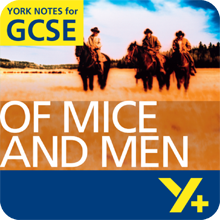Examiner's Notes
You assessed this answer as a D grade.
Hover over the highlighted text to read the examiner’s comments.
There are various types of dream in the novel. Many of the characters have their own dream, most notably George and Lennie who dream of, how, 'Someday – we're gonna get the jack together and we're gonna have a little house and a couple of acres.' Money – or lack of it – is a key barrier, but tantalisingly their dream briefly reaches out to Candy, the injured ranch hand, who has some money put by. Curley's wife, too, has dreams – of being a movie star, and remembers a man who, 'says he was gonna put me in the movies.' The ranch hands dream of being romantic cowboys, and perhaps Curley even imagines being a boxer. Most characters in the novel are unhappy with their real lives, and to make them bearable have their dreams. These dreams are an escape from real life, but also enable the characters to carry on.
The other dream in the novel is the 'American dream'. America was founded by people fleeing persecution for their beliefs, or fleeing poverty. The 'American Dream' was to live free in the countryside or on the frontier, self-sufficient and owing no one anything. This is what George and Lennie want. Their dream symbolises the wider American ideal of escape and exploration, to have a bit of land of their own. Their lives are dominated by people such as the Boss of the ranch. George and Lennie want to be free of the power of such people and, crucially, to be their own boss.
However, George and Lennie are unable to achieve their dream at least in part because Lennie is a damaged person who cannot control his own strength. He thinks the mice he pets dies 'because they was so little' and cannot admit it is because he squeezed them too hard. Here, a lack of vision and understanding undercuts the possibility for escape from the hard life he leads. This same lack of understanding leads to the clumsy killing of Curley's wife, and the tragic consequences that follow. Yet Steinbeck also makes clear his view that in life few if any people achieve their dreams, 'Nobody never gets to heaven, and nobody gets no land. It's just in their head.' Steinbeck is not sentimental about this. He gives no evidence to suggest that the animals on a piece of land he owned with George would live any longer than the others he has petted. The gigantic rabbit in Lennie's fantasy vision at the end of the novel says to him, 'You ain't fit to lick the boots of no rabbit. You'd forget 'em and let 'em go hungry.'
Dreams are therefore a very important part of the novel, and one of its major themes. Through the failure to achieve dreams, and the unhappiness that makes the characters need them in the first place, Steinbeck presents a bleak, realistic and perhaps hopeless view of the world. It could be argued that in allowing themselves to dream, Lennie and George set in motion the very events that destroy that possibility.
